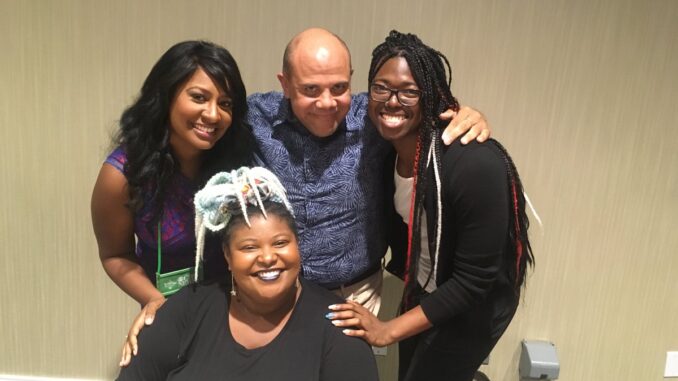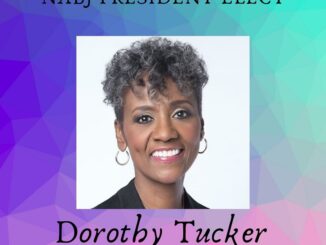
By Calen Razor
NABJ Monitor
Last year’s NABJ treasury race sparked a conversation within the organization about frustrations among LGBTQ+ members after a series of tweets from candidate Ernest Owens highlighting the issues.
Since then, NABJ President Dorothy Tucker and LGBTQ+ Task Force Co-Chairs Tre’vell Anderson and Femi Redwood have used their leading roles to begin the necessary changes to address those concerns.
Time will tell if queer members begin to feel that change has been made within the organization. But in the meantime, the community’s efforts are in full effect.
For the first time in its history, an NABJ President —Tucker— released a statement in November 2020 declaring “NABJ Will Be a Safe Space for LGBTQ+ Members.”
“There was pressure in the beginning to [quickly] put a statement out condemning homophobia,” Tucker said. “But as a reporter, if you put a statement out claiming you don’t like something, the next question will be: So what are you going to do about it?”
Before releasing a statement on behalf of NABJ, Tucker spent time with members of the community learning what specific issues people had experienced — with direction and advice from Redwood and Anderson, who sits on the board as Region IV director.
Some steps they’ve taken to reiterate NABJ’s inclusive culture are providing LGBTQ+ sensitivity training to all members, including the board of directors, and updating the organization’s Code of Conduct and Anti-Harassment Policy, “adding sexual orientation to the existing categories of gender identity and gender expression,” according to Tucker’s statement.
“Every change that has been made regarding LGBTQ+ issues was because members of the task force have verbalized it and put in the work,” Anderson said. “I recognized that the Code of Conduct wasn’t as inclusive as it could be so I brought it up. Dorothy and the board recognized my concern so we updated it.”
In another effort to highlight the experience of queer people in the association, Anderson released a two-part oral “History of NABJ’s LGBTQ+ Task Force.” The piece highlighted the efforts made by some of the task force’s founding members to make the organization more inclusive for gay, lesbian, bisexual, queer, and trans journalists.
Back in 2005, it was a struggle for them to even get approval from the board to create the task force. So to some of the members, including Jerry McCormick, founding president of the San Diego Chapter, Tucker’s statement was a real indicator of progress for the community.
“For the president of the organization to openly recognize and say this is a safe space for LGBTQ+ members, that shows how far we’ve come in the 40-plus years since the organization has been in existence,” McCormick said.
However, Owens feels the statements and sensitivity training don’t do much in terms of moving the needle, and he continues to voice his opinion on the organization’s relationship with the queer community after bringing attention to the conversation via social media.
“I felt like a lot of this was performative and a surface-level response,” Owens said. “Was it horrible? No … but I encourage chapters to work on these issues internally.”
And while Anderson has been heavily involved in the work that has been done throughout the past year, they have yet to reach a point to comfortably say the organization is fully prepared to move forward on queer issues.
“I have personally emailed my co-board members explaining and teaching them how to use my [non-binary] pronouns, yet I’m still misgendered every single time we meet,” they said.
While it will be no easy or quick task, Tucker, who is running for re-election, hopes to continue in her position as president and remain at the forefront to take concerns head-on.
“[Working with the task force] was a learning experience for me,” Tucker said. “Sometimes it was uncomfortable because I didn’t know all of the language and perceptions that could be offensive. But I was so appreciative of their patience.
“Task force members reporting their personal experiences to me, even if I don’t see it, is reason enough for me to stop and do something about it.”
Much of the interaction and mixing of members happens in the excitement of NABJ’s annual conventions. Since the pandemic put a halt to large gatherings in 2020, the organization has yet to have that experience since 2019.
So even though its leaders have been putting policy in place in these digital times to foster an inclusive nature, queer members may not know the effects of this work until everyone is face to face, task force members said.
“We don’t know, yet, that a group of us can be sitting around kiki’ing and not have folks look at us crazy,” Redwood said. “The task force realizes that while [our accomplishments] feel great, we don’t really know yet.”
NABJ Parliamentarian Michelle Fitzhugh-Craig remains optimistic about in-person interactions in the future.
“[Task force efforts] will help when we do come back together to make us even stronger,” Fitzhugh-Craig said.
The task force’s main focus at the moment is developing strategies to support Black LGBTQ+ journalists within the organization.
Since last year, the co-chairs have conceived two exciting opportunities for queer students, one of which is a new scholarship in the name of Monica Roberts, a trans journalist who used her platform to cover overlooked topics within the trans community. The other is a grant in the name of NABJ’s first openly gay president, Thomas Morgan.
As time goes on, the organization and task force will take baby steps into the right direction. Owens’ tweets are not the first effort to call change into action and, according to task force founding member Patrick Riley, they certainly won’t be the last.
“I think that people’s beliefs and positions are changing every day,” Riley said. “And it is because the representation of LGBTQ+ people is proving itself to not be going anywhere.”




Be the first to comment